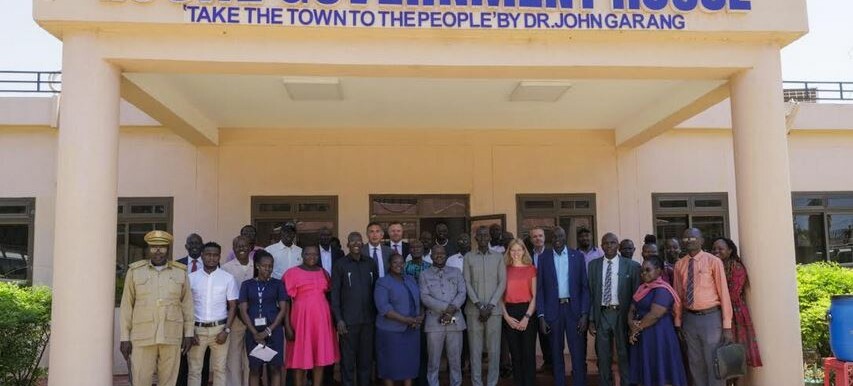The Multi-Donor Action “Strengthening Local Governance and Peaceful Coexistence in South Sudan” (LoGo) was launched on Wednesday at the Local Government House in Juba.
According to a Thursday press release from GIZ, the three-year Action is jointly co-financed by the European Union (EU) and the German Federal
Ministry for Economic Cooperation and Development (BMZ) and will be implemented by the Deutsche Gesellschaft für Internationale Zusammenarbeit (GIZ) as a part of the BMZ project “Local Governance and Promotion of Peaceful Coexistence in South Sudan.” The total funding of the Action is 6 Million EUR of which the EU has contributed 5 Million.
“The official launch was hosted by the South Sudanese Local Government Board (LGB) and attended by the Ambassador of the Federal Republic of Germany to the Republic of South Sudan, the Head of Cooperation of the EU, and representatives of national and international organizations as well as by the county commissioners and executive directors of the six partner counties of the Action,” the statement read in part. “In addition, national and international partner organizations of the LoGo project presented their project activities to the participating guests in an interactive format. The main objective of the LoGo project is to contribute to local community peace and resilience in South Sudan.”
South Sudan remains one of the most fragile contexts globally with high levels of inter- and intracommunal and inter-ethnic violence. Sexualized and gender-based violence is widespread. Local administrations are often unable to provide public services and formal and informal spaces for socio-political and economic participation, especially for women and young adults, are limited.
“The LoGo project aims to strengthen the capacity of communities and civil society, including women, youth, and those living in marginalized situations, to participate and engage in inclusive peacebuilding, recovery, and reconstruction. Dialogues between young adults and local authorities promote a peaceful environment and representatives of youth and women organizations receive support to develop their professional skills to generate financial income,” the statement said. “In addition, the Action strives to increase the transparency of local administrations and to ensure that the development needs of the public are being considered by training local administrative staff and facilitating joint planning sessions with the communities.”
In his opening remarks, Gabriel Leonte, Head of Cooperation of the European Union, underlined that as public institutions closest to the population, local authorities have a key role to play in safeguarding vulnerable populations and communities.
On his part, Christian Sedat, the Ambassador of the Federal Republic of Germany to the Republic of South Sudan, said, “It is fundamental to simultaneously empower civil society on institutional transparency, accountability, access to resources and basic services.”
The lead executing agency of the project is the South Sudanese Local Government Board, which works under the Office of the President and is legitimized by the Local Government Act 2009. The Action is implemented at the subnational level in 6 partner counties; Akobo, Aweil West, Manyo, Mundri East, Terekeka, and Yei. It is scheduled to run from January 2024 to December 2026.
This Action contributes to the Team Europe Initiative (TEI) “Good governance, peace and rule of law for a just society.” Team Europe’s support for good governance, peace, and the rule of law for a just society aims to contribute to a successful transition of South Sudan, with the implementation of the peace agreement signed in 2018 and its roadmap adopted in 2022 at the center of Team Europe’s interventions.
According to the statement, in South Sudan, GIZ works on behalf of the German Federal Ministry for Economic Cooperation and Development. The project Strengthening Local Governance and Peaceful Coexistence in South Sudan is co-funded by the European Union. Germany supports the long-term development of South Sudan, above all in the fields of local governance, rural development, sustainable agri-food systems, water and sanitation supply, peace and reconciliation, gender equality, and SGBV prevention.




